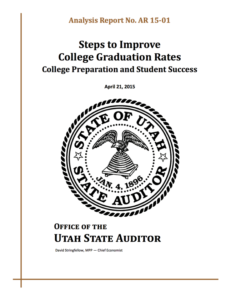 The State Auditor’s Office released a report on the preparedness of college students as well as the success of students who attend USHE institutions. The report provides an independent analysis of the USHE data maintained by the Office of the Commissioner, which has been maintained since 1999 and provides foundational data for key reporting, including the annual USHE Data Book. The findings of the Auditor’s report not only reinforce the objectives of current USHE-wide initiatives of the State Board of Regents, but provide additional independent validation of the quality and use of data collected by USHE over the years.
The State Auditor’s Office released a report on the preparedness of college students as well as the success of students who attend USHE institutions. The report provides an independent analysis of the USHE data maintained by the Office of the Commissioner, which has been maintained since 1999 and provides foundational data for key reporting, including the annual USHE Data Book. The findings of the Auditor’s report not only reinforce the objectives of current USHE-wide initiatives of the State Board of Regents, but provide additional independent validation of the quality and use of data collected by USHE over the years.
Citing data from ACT, 84% of 2013 Utah high school graduates wanted college degrees, yet only 25% appear well prepared for success in college according to ACT Benchmarks. Recently, the trend has been less than 50% of students who attended more than 4 semesters of college have actually attained an Associate or Bachelor degree.
The reports recommends the following:
- More accurate communication of the actual requirements for college readiness.
- Guiding more college bound high school students into rigorous college preparation courses.
- Active monitoring by public education to improve the readiness of college bound students.
- More realistic assessment and communication by higher education to students regarding their preparedness for college.
The report confirms much of what higher education officials know from state and national data about the importance of college preparation and the barriers to earning a degree:
- Better-prepared high school students are more likely to succeed in college.
- Time can be an enemy to college graduation. Studies show students who take at least 15 credits per semester will earn better grades, save money and graduate sooner.
- Students who are the most academically and financially prepared are more likely to enroll in challenging majors.
- Math education plays a significant role in college and STEM completion.
Specific strategies adopted by USHE in recent years focus on improving student preparation, better informing high school students of what is needed to succeed in college (including math), and steps for successful college graduation:
Student Preparation: Regents’ Scholarship and Utah Scholars
Established in 2008, the Regents’ Scholarship encourages Utah high school students to take a college prep curriculum above and beyond the Utah high school graduation requirements. This merit-based scholarship provides a clear college preparation path for high school students as well as influences the types of courses offered by Utah’s public high schools.
2,328 students were awarded the Regents’ Scholarship in 2014. USHE data indicates students who receive the scholarship are more likely to be successful in college: on average, recipients earn a higher GPA and complete their degree more quickly than those who do not receive the scholarship.
The Regents’ Scholarship is funded by the Legislature and administered by the State Board of Regents. Applicants and awards for the Regents’ Scholarship have grown annually by at least 20%.
Utah Scholars is the outreach effort associated with the Regents’ scholarship. While any Utah high school graduate can apply for the scholarship, Utah Scholars focuses on reaching underserved middle school students. The program coincides with the time 8th graders register for their 9th grade classes – and uses in-classroom presentation by volunteers who encourage students to take a rigorous course of study in grades 9-12 that goes beyond the requirements for high school graduation. This program, administered by the Office of the Commissioner, touches every 8th grader in 16 Utah school districts.
Math: USHE High School Math Recommendations
In March 2014, the Board of Regents approved Recommendations for High School Mathematics Preparation to clarify what is expected of Utah high school students to successfully prepare for college. Those recommendations are as follows:
- Each year in high school, students should take the most rigorous mathematics course for which they qualify. Utah high school and college data is clear that a student who successfully completes math the final year of high school is twice as likely to complete their college math requirement.
- All students should successfully complete high school Secondary Math I, II and III, or Secondary Math Honors I, II and III.
- Students who intend to pursue a college degree should complete one or more mathematics course(s) beyond the high school math required for graduation.
Better Information to High School Students: Step UP Utah
StepUP to Utah Higher Education is an outreach effort to provide authoritative information to students and families on college, to develop and deliver professional development events and resources to secondary counselors, and expand the partnerships among federal, state, local agencies, community based organizations businesses and public and higher education to significantly increase the number of underrepresented students who succeed in college. A couple of the most visible efforts of StepUP include:
- Annual Counselor Conference – An annual conference attended by more than 600 secondary counselors, focusing on providing the most relevant information on college readiness for the students they serve.
- Utah College Application Week – working with more than 10,000 Utah high school seniors in 49 high schools to complete applications for college in November of their senior year, with a particular focus on assisting underserved and first-generation students.
- StepUP READY grants – Partnership grants between USHE institutions and high schools focusing on increasing the number of Utah’s public high school students who graduate college-ready and enroll in a post-secondary institution. All grants required a robust partnership between the K-12 schools and the higher education institution to ensure intentional efforts surrounding college preparation, enrollment, and first-year transition. Outcomes are measured with commonly-accepted metrics on college readiness.
Student Success in College: USHE Completion Strategy
In 2013, the Board of Regents launched a multi-year strategy to improve rates of student completion by adopting specific system-wide initiatives, working with USHE institutions on their implementation. USHE institutions are required to provide annual updates to the Board of Regents toward their goals in support of the following objectives:
- Establish 15 credit hours per semester as the normal full-time course load for students. Each institution has set a target based on the % of students it has taking 15 credits/semester or 30 credits/year
- Maintain plateau tuition at seven institutions, and work to inform students at all institutions so they understand the financial benefits of taking 15 instead of 12 hours per semester (or 30 hours per year including summers).
- Create standardized semester-by-semester degree program maps with specific recommended courses, and actively promote them to current and potential students. Institutions have assessed how complete these degree maps are, and have set a target date for 100% completion by the end of 2015.
- Encourage students to enroll in an appropriate math course in their first year in college; transition students from developmental to credit-bearing math within three semesters; and market Math 1030/1040/1050 as a preferred concurrent enrollment option for high school students who qualify to take these courses.
- Expand feasibility of reverse transfer/stackable credentials. Institutions that grant certificates have set a goal to increase the number of certificates that are contained within an associate degree, and associate degrees that can be be embedded within a bachelor’s degree. Associate degree-granting institutions have also set a target for associate degrees awarded to students and for increasing reverse transfer.
As the provider of postsecondary education for over 80% of Utah high school graduates, who go on to college, Utah’s eight public colleges are committed to providing students a high quality, affordable college education. Proof of this commitment is demonstrated by the fact that a USHE four-year degree, on average, is the third least expensive to obtain in the country. With continued state support, higher education leaders continue to work towards these goals, knowing challenges exist and more is to be done to help students be better prepared for success in college.

